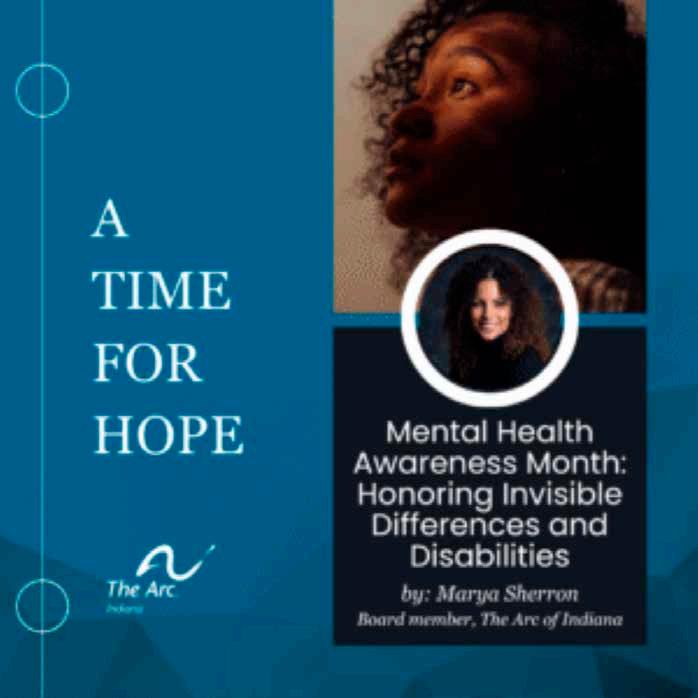
5 minute read
Seeing The Unseen: Honoring Invisible Differences This Summer
MARYA PATRICE SHERRON
Mental Health Awareness Month is a special time to pause, reflect, and advocate for what so often goes unseen. Now that May has come and gone, it is important to remain mindful, observant, and willing to listen. I want to speak directly to families like ours—families living the daily reality of invisible differences and disabilities. Because unless you’ve lived it, it’s hard to understand how heavy invisible battles can be—and how deeply they shape every part of life.
THE HIDDEN WEIGHT OF ANXIETY AND DEPRESSION
As we move into the heart of summer, I’m reminded that June brought renewed awareness of anxiety and depression— two invisible challenges that touch millions of lives quietly, profoundly, and often without notice from the outside world. But just because June has passed, doesn’t mean those struggles have.
In fact, summer can be especially difficult. While schoolyear routines are paused, so are the structures that some youth rely on to feel safe and steady. Long, unstructured days can create opportunities for rest, but they also open the door to heightened anxiety—particularly when social media becomes a primary source of connection, comparison, and self-worth.
Too much time online can quietly erode mental health, especially for youth who already struggle with anxiety or depression. The curated images, constant notifications, and pressure to stay connected can amplify feelings of inadequacy or loneliness.

For many families, anxiety and depression are not “topics of the month”—they are daily realities that shape how we live, love, and support one another.
• They are the uninvited guests at breakfast tables.
• The tension that thickens the air during morning routines.
• The silent battles fought behind closed doors when simply showing up feels impossible.
• To honor those who live with these challenges year-round, I want to pause here and share a little bit of our personal journey—because behind every statistic is a story, and behind every story is a family doing their very best.
• It’s a full-body shutdown.
• It’s tears at the breakfast table.
• It’s shoes that won’t go on because “they feel wrong.”
• It’s the clock ticking louder and louder as the school bell looms.
What people don’t see is the aftershock:
• The fear of being labeled “neglectful” or “irresponsible.”
• The desperate prayer that tomorrow will be better.
THE DATA BEHIND THE STRUGGLES — AND WHAT IT MEANS
The numbers in Indiana paint a stark picture: Nearly half (47%) of Indiana high school students reported struggling with depression last year.
• 6% made a suicide plan. 15.7% attempted.
(Source: Indiana Capital Chronicle, 2024)
That’s not a handful of kids. That’s nearly one in five students missing school at a level that alarms the system—without the
But what families need is for someone to ask: “What happened this morning?” “How can we help you get here tomorrow?” “What support does your family need to heal and strengthen?”
system fully asking why. Additionally, mental health services are critically underfunded and understaffed:
• Indiana has one school psychologist for every 2,607 students (recommended is 1 per 500).
(Source: Indiana Capital Chronicle, 2024)
Imagine…
One psychologist, trying to support thousands of hurting young souls. It’s no wonder so many families feel like they’re shouting into the void when asking for help.
WHY FAMILIES NEED SUPPORT — NOT DISCIPLINE
Too often, systems ask: “Why aren’t you here?” “Why are you late again?” “Why are your grades slipping?”
But what families need is for someone to ask: “What happened this morning?” “How can we help you get here tomorrow?” “What support does your family need to heal and strengthen?”
• Morning battles leave parents arriving late to work, risking jobs.
• Siblings absorb the stress and tension.
• Relationships fray under the strain of trying to “look normal” to the outside world. And when absentee policies punish without understanding, they drive a wedge between schools and families—the very two systems that should be working together.
The result: Families retreat. Students shut down. And invisible struggles become even more invisible.
RECOGNIZING THE SPECTRUM OF INVISIBLE DISABILITIES
Anxiety and depression are two faces of this larger conversation. But there are countless others whose struggles we can’t always see:
• Autism Spectrum Disorder — especially for those who mask in public and crumble at home.
• Deafness and Hard of Hearing — where communication barriers breed isolation.
• Severe PTSD — where loud noises, crowded hallways, or even a wrong glance can trigger panic.
• Chronic illnesses like fibromyalgia, juvenile arthritis, POTS — where energy evaporates without warning.
• Learning disabilities that leave students exhausted from simply trying to keep up.
Invisible doesn’t mean imaginary.
• It means real, but hidden.
• It means private battles being fought bravely every day— often with no applause, and sometimes with judgment instead of compassion.
A Loving Call to Action
• Pause before you judge.
• Ask before you assume.
• Care before you correct.
When you see a youth missing school—ask: What’s going on beneath the surface?
• When a student is late every morning—wonder: What battle did they fight to even show up today?
• Because feelings matter.
• Because invisible differences are still real differences.
• Because no one heals in isolation—and our community can only be as strong as our willingness to see each other fully.
• You never know when your compassion might be the turning point for a struggling child—or for a weary parent fighting hard to hold it all together.
People matter. Families matter. Our community matters.
This summer, as we enjoy longer days and looser schedules, let’s also commit to being a little more present, a little more thoughtful, and a little more willing to look beyond the surface. Because honoring the invisible isn’t limited to a month on the calendar—it’s a choice we make every day.

Marya Patrice Sherron, MFA is a writer, advocate, and community leader devoted to amplifying marginalized voices and building inclusive communities. A former professor of Creative Writing and Black Studies, Marya is the founder of KI Productions, an independent publishing and production company launched in 2021 with the guiding belief that every story matters.










